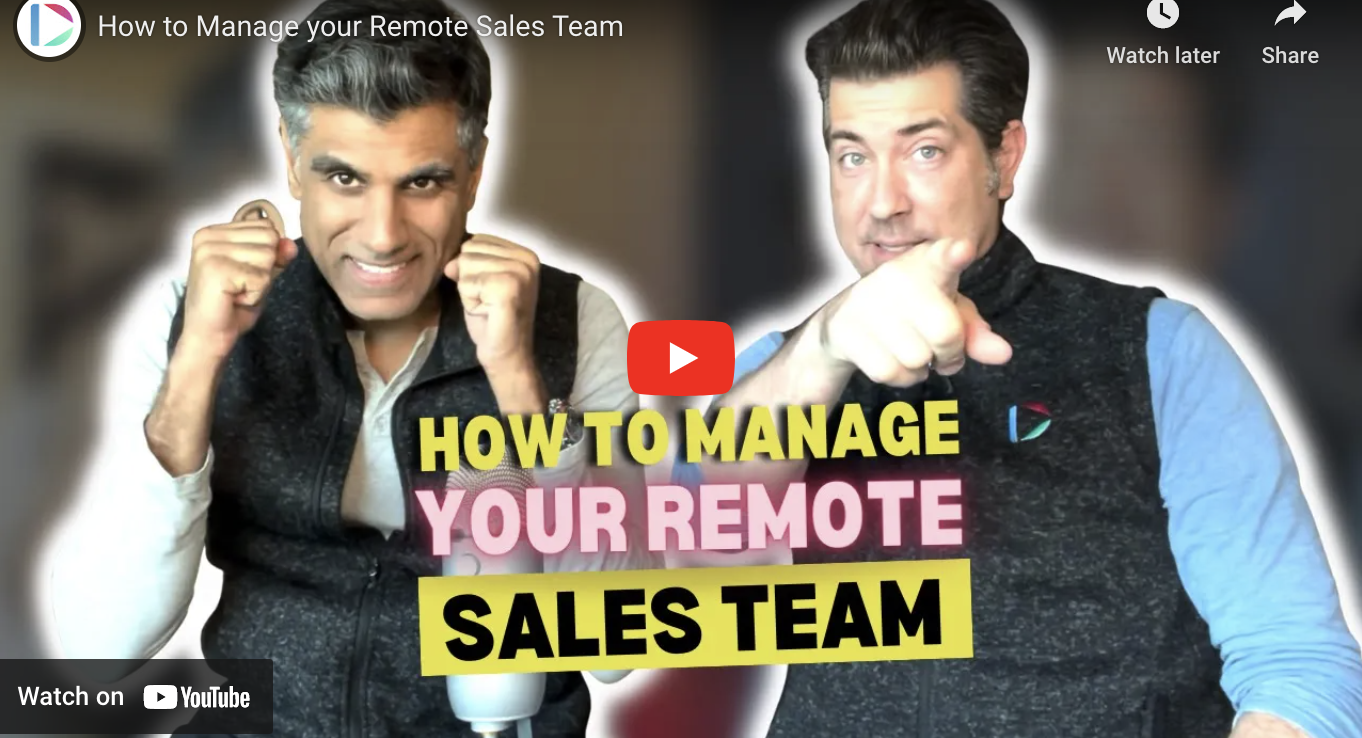In this recap from a recent episode of RevShow, Rob and I speak about how to manage your remote sales team. Whether you were just put in charge of a remote sales team or have been leading a remote sales team for some time, this post is packed with helpful tips and strategies for getting the most out of your hard work. If you would like to view the video in its entirety, go ahead and click on the link above.
Have you been managing a remote sales team? At the same time, are you growing that team? Are you optimizing that team?
A remote sales team can be a fantastic addition to your business. There are plenty of reasons why, ranging from the fact that you can hire the best talent from around the world or that you can find the perfect sales professional to fit your culture. At the same time, there are some unique challenges that come from managing a remote sales team. These challenges are not insurmountable, yet they can make managing that sales team much more difficult than you may expect.
In this episode of RevShow, we took a deep dive into how you can successfully manage your remote sales team. Not only that, but we are going to talk about how you can grow that team and how you can optimize it to reach your sales and marketing goals. At the end of this post, you will have a much greater idea of what some of the common challenges are in managing a remote sales team and how you can overcome those challenges. With this knowledge in mind, you can make your life easier and get much closer to whatever goals you have.
Let’s jump into it.

The Challenges of Managing a Remote Sales Team
Like we have done in other videos and recaps, I think it is helpful to start this conversation by discussing the challenges of managing a remote sales team. If you have been in a managerial position for some time, you are probably already familiar with some of these challenges. You may have overcome these challenges or decided that these challenges were so great that you wanted to give up on a remote sales team altogether.
At Dubb, we have interviewed countless numbers of people about this topic. There are plenty of people that have experience in this domain and want more information on how to manage a remote sales team. Essentially, these people manage remote sales teams and they boiled it down to three challenges. Granted, this doesn’t mean that these are the only challenges that you’ll encounter when managing a remote sales team. It does, however, cover the biggest challenges.
The first challenge involves process. You need to ask yourself what the process is and whether it is being implemented by the entire team. I’m going to provide a few more tips and trips on process (specifically creating scripts) further in this post. That said, the challenge is certainly there. If you can’t create a great, robust process that all of your remote sales professionals can follow, you will find it very difficult to get value out of your remote sales team. To put it another way, process is the thing that can make or break your remote sales work.
From there, the second challenge revolves around trust. You need to ask whether there is trust between leadership and the team. Do people feel like they can trust their colleagues and team members to do what they are supposed to be doing? On the other hand, are the team members at home playing guitar all day? Like process, trust is a huge variable that will make your life easier or much more difficult. If you can trust your remote sales team, you will find it much easier to accomplish your goals. On the other hand, if that trust isn’t there, you are in for a rough time.
Last, (but not least), there is a challenge around results. You need to examine whether you are comfortable with the results you are accomplishing and the way that you are measuring those results. Let’s face it: as sales professionals, we are in a results-oriented business. While it is extremely important to build strong, long-term relationships with our customers and prospects, we need to make sales. If your sales team cannot get the results that you require, it makes it much more difficult to justify the existence of a remote sales team. As the sales world has become increasingly competitive, this is a challenge that has perhaps gotten even harder in recent years.
All of these things are critical to consider when you are managing your remote sales team. The good news? In the rest of this blog post, you are going to learn so many ways that you can tactically improve upon all three of these challenges (and more).
Solutions on How to Manage Your Remote Sales Team
Now that we have talked about some of the challenges of managing a remote sales team, I want to discuss some of the solutions. At Dubb, we are extremely solutions-oriented, so I’m excited to share some ways that you can better manage your remote sales team today.
To kick this off, I want to talk about an important word in this discussion. That word is systematized. When you are managing a remote sales team, it is vital to create sound, robust processes. In other words, it is critical to systematize everything.
Granted, this may sound robotic or sound like there isn’t much room for creativity here. As John Lennon once said, “Life is what happens when you are busy making other plans.” However, what is interesting about this is that around 90% of what we are doing in sales can be systematized.
When we think about systemizing something, we think about what happens when something specific happens. For instance, if someone completes a lead form on your website, what takes place? Is there a certain person or department within your company that by default picks up the phone or sends an email? Is it sorted based on geofencing, company size, or something else?
There are many different factors that can determine what can take place in your specific system. The truth is that there are no real right or wrong answers here. You may want your prospects to be led down a specific sales funnel and one of your competitors may take a totally different approach. That’s okay. What is important here is that you have created a system or process that can keep your remote sales team on track. What’s better is that you can constantly improve that process by getting feedback from your remote sales team and by looking at the data.
Use Scripts
One of my favorite ways to systematize the management of a remote sales team is by using scripts. My colleague Rob is an expert in sales scripts. His big take on the subject is that sales scripts are wonderful because they can keep you efficient and effective. They keep you on message, no matter which audience you are speaking with.
Many times, even when you know a topic very well, you can easily go off on tangents. Tangents, while they may seem useful at the time, can lead to wasted time. They can even cause you to engage in messaging that you weren’t even thinking about. That messaging may not even be related to what that prospect or viewer needs to hear.
Considering all of this, scripting (whether it is word-for-word or bullet-pointed) is completely designed to keep you on message while bringing your authentic self to the conversation. Once the script is written, all you need to do is bring you.
With all of this said, there are some people that are resistant to scripts. One of those objections is something like, “Scripts sound too robotic.” For instance, if someone is using the teleprompter feature on the Dubb mobile app (which you can find on both iOS and Android), it may look like they are reading. Seeing this, you may get some people that say, “Well, as sales professionals, we should speak from the heart. We should be authentic, and because of this, we shouldn’t use scripts.” However, there are other sales leaders and sales professionals that love scripts.

So where do we go from here? Rob believes that so long as you are writing from the heart, you will speak from the heart. Many times, when you write something, that written text is coming from your authentic self. So all you are really doing is taking the written authentic word and making the authentic video version of that word, which means that it is inherently a version of you. You can absolutely keep it authentic by writing and running your own script.
At the same time, if a script is written for you, then you have to make it your own. For instance, if you are great at keeping eye contact, make sure that you are doing that when reading the script. If you naturally pause during conversations, make sure you are doing that in your videos. If you naturally look away and appear pensive, keep doing that. This is tougher than writing the script for yourself, so if you are giving a script to your remote sales team, make sure that they are being themselves when they are using your script.
In the end, keep doing the natural things that you do. Having a script and/or a teleprompter doesn’t make you turn into a robot. Bring yourself to your videos. Recognize that the script is there to keep you effective and efficient. You don’t have to sound robotic; it just takes a little bit of practice.
While it may sound kind of funny, take some time to talk to yourself in a mirror. You can get used to seeing yourself speaking and seeing how you come across on camera when you are reading a script. Also, don’t hesitate to read things out loud—even when you aren’t recording a video. You can choose to read virtually anything, whether it is a book, blog post, or something else. Get used to speaking out loud. Just remember: whatever you naturally do in conversations with others, do the same in your videos. It’s effective because that video is going to another human being.
Granted, this advice should also be given to the members of your remote sales team. Encourage them to practice your scripts—even if it is in the mirror. You can also encourage them to practice recording sales videos. They don’t even need to send those videos to prospects. They can immediately delete them after recording. The goal is to get in the habit of recording and using a script.
Choose Great Software
The next critical thing when managing and growing a remote sales team is choosing great software. Essentially, it is all about selecting great tools that make your life easier. When managing a remote sales team, you want to invest in the tools that will help your remote colleagues easily complete their work and help you oversee their work. The great news is that there are plenty of awesome tools in the marketplace today.
Ask yourself: do you have a great messaging app like Microsoft Teams or Slack? Do you have a great project management tool like Asana, Basecamp, or Monday.com? Do you have a good CRM platform like HubSpot or Dubb? Do you have a great video sales platform (also like Dubb)? What are you using to collaborate with documents and presentations? Are you using Google Docs, Microsoft Office, or Canva? At Dubb, we actually love using Canva because it helps us create graphic designs, presentations, slides, and any other type of graphical assets. All of these graphics and designs look great and are extremely easy to make and collaborate on.
The last thing we need to talk about here is data. You need to ask what you and your colleagues are doing to manage your data. To be clear, when I say data, I am talking about reporting here. It is helpful to look at your reports daily, weekly, monthly, and yearly. Think about how you are interpreting this data. Consider the inputs and outputs.
Ultimately, data management is such a critical part of gaining trust and managing a remote sales team. Most importantly, by gathering and understanding your data, you can get much closer to your growth goals. So when you are going to manage your remote sales team, think about how you can efficiently gather data and efficiently interpret that data. You will thank yourself later.
Hiring
When thinking about how to manage your remote sales team, it is also critical to focus on hiring. Ask yourself: what is your hiring process for people on your remote sales team? What are the traits that they have? What is their background and what are their interests? What are their goals? In asking all of these questions, you must also consider whether there is a good cultural fit. All of these things are important to think about, so make sure you are spending a good amount of time on these questions.
Throughout this process, our entire team at Dubb looks at certain criteria. First, you want to ensure that your remote sales colleague is responsible. While it may sound too straightforward and obvious, remote sales teams are still a relatively new phenomenon. Back in the day, it would seem virtually impossible to hire and manage a sales team in different locations. Today, however, remote work is a mainstay. In fact, a large percentage of companies out there have large remote teams. Because of this, the first thing you want to have is someone that is very responsible.
From there, you want to hire someone who is an effective communicator. Being an effective communicator in Slack, Microsoft Teams, or other communications tools is critical. All of your remote sales colleagues need to be effective in their messaging. At Dubb, one of the most effective ways that we communicate is through video. In this type of situation, you would send an asynchronous piece of content video to another employee or coworker. This is another great way to communicate. Asynchronous video isn’t the only way to communicate here. For instance, you can have a synchronous meeting over Zoom (or a similar tool). If you choose this, however, you need to be effective with your communication. We prefer asynchronous communication because we can record videos on our own time and how our audiences consume those videos on their time.
Another thing that you really want to focus on here is finding someone who is up to the challenge. If you are considering a remote employee who is responsible and an effective communicator, you also want to confirm that they are ready to tackle the work in front of them. If the motivation is truly there, you will find that it is a huge asset in keeping your remote team together.
Also, we recommend that you challenge your prospects throughout the hiring process. For instance, ask a prospective candidate to record a sales video and see what it is like. See how comfortable they are on camera. You can also ask them to write a script or create a process to call cold or warm leads. The idea of testing someone before they join your organization and culture can determine how they will ultimately fit.
To wrap this up for all of you basketball fans out there, ask yourself: are you looking for a Michael Jordan? A Scottie Pippen? A Dennis Rodman? A Larry Bird? Think about the type of person that will not only have the technical skills that you need, but that will fit into your culture. While it may take some time to find that person, the investment will absolutely be worthwhile.
Avoid Meetings to Have Meetings
Another key tip in this discussion of how to manage your remote sales team is to avoid unnecessary meetings.
Have you ever heard the expression, “Let’s not have a meeting about having a meeting?” You want to keep this sentiment in mind as you are managing your remote sales team. The more meetings you have, the less productive you are going to be. Have a good, efficient, and productive meeting, and then leave people alone. Your colleagues have a better chance of getting things done. Then, if you have a message that you want to send to one of your colleagues on Slack or Microsoft Teams, send that efficient message. Don’t keep pinging them, as that is another persistent distraction that will keep them from doing their work.
This is a quick tip, but an important tip. Err on the side of not having meetings. And when you are outside of your meetings? Let your remote sales team do their own work. They will be more efficient and more effective this way instead of constantly interrupting them or micromanaging them.
Create and Set Goals
The last (and most important) suggestion that we are going to offer involves goals. Do you have them? If not, you definitely should. In the remote team setting, goals are so important because they keep everyone accountable and on track toward growing the organization.
Google pioneered this system called O.K.R.s. This stands for objectives and key results. What’s really interesting about this model is that it creates an environment of transparency among the entire team. Everyone has to specify three goals for each quarter and all of the individual subtasks to accomplish those goals. Through this system, you prioritize transparency and alignment. Everyone on the remote sales team probably has similar (or the same) goals. That is to get more leads, get more clients, and get more referrals. Having all of these goals available for everyone to see is key for your remote sales team. Not only does it show transparency, but it shows alignment. It also has measurability, which makes it obvious whether those goals are accomplished or not.
One of the most important ideas within O.K.R.s is stretch goals. If you haven’t heard this term before, stretch goals mean that if you are trying to reach $1 million in revenue for the quarter, go for $4 million or $10 million. If you land at $2 million or $3 million, you have doubled or tripled your initial goal. Ultimately, stretch goals inspire and motivate us to accomplish more than we initially thought.
Granted, O.K.R.s is not a perfect system. It does have your own criticisms (there are resources online that you can find to learn more). The idea here, however, is transparency, alignment, and measurability. It can feel truly amazing when you go above and beyond your limits and expectations. Push on these areas and you are in a much better position to get the results that you dream of.
Go Forth and Manage Your Remote Sales Team
These are just some of the many tips and tricks that you can use to better manage your remote sales team. Even if you just implement one (or several) of these ideas, I am confident that you will start to get much closer to your sales goals. So whether you just started managing your remote sales team or have been managing a remote sales team for some time, take some time to incorporate these tips into your sales processes. I think you will be satisfied with the final results.

At Dubb, we love talking about subjects like how to manage your remote sales team. If you have any questions about this topic or would like to learn more about how Dubb can help you manage your remote sales team, click here. You can also learn more about Dubb by clicking here. If you would like to get a free 14-day trial of our premium plans, you can also do so by clicking here.


